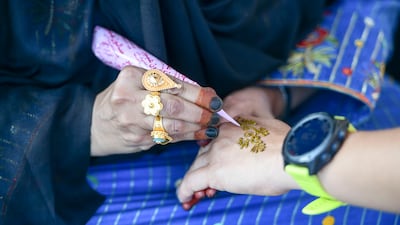Henna rituals and practices, Nabulsi soap from Palestine and roses from Saudi Arabia are among the cultural heritage practices added to Unesco's Intangible Cultural Heritage lists.
Established in 2008, the lists aim to ensure better protection of cultural heritage and to promote their significance. This year's list is being compiled at a general session taking place in Paraguay until Saturday.
Intangible Cultural Heritages are divided into several lists, including the Intangible Cultural Heritage of Humanity, which encompasses the practices and expressions of communities, and the Intangible Cultural Heritage in Need of Urgent Safeguarding, which last year included Syria's glassblowing practice.
Here are the cultural heritage practices from the region that have been added.
1. Henna rituals, aesthetics and social practices
The UAE is one of 16 countries, including Saudi Arabia, Morocco and Palestine, which submitted traditional henna-making practices to be added to the list. As part of the joint submission, the Permanent Delegation of the UAE to Unesco produced a video shot in Al Ain featuring an Emirati woman discussing the importance of the craft as part of their submission.
The written component of the submission also highlighted the social role henna plays in the region. “What makes henna a distinctive element in the heritage of the participating countries is its transmission throughout successive generations as well as the broad community participation in its rituals and traditions, which creates an atmosphere of festivities and joy for both men and women," it read.
2. Tradition of Nabulsi soapmaking in Palestine

The submission by Palestine's Ministry of Culture described the tradition of Nabulsi soapmaking as an integral part of its cultural heritage and widely practised by its diaspora. Dating back more than 1,000 years and named after the Palestinian city, the soap is made from olive oil, water and lye.
“Making Nabulsi soap at home represents a cultural value in itself because it is associated with good management of a house that contains all the necessities including food, water, and cleaning materials,” read the submission. "The use of olive oil reflects people’s strong relation to the land, and the traditional Nabulsi soap making provides a good income for the families.
“Making Nabulsi soap at home encourages families to share. In the community, people use their homemade Nabulsi soap as a personal gift for celebrations. The element encourages dialogue and identity and connects both family members and the community concerned.”
3. Taif roses from Saudi Arabia

The Taif region of Saudi Arabia is known for its rich history, culture and agricultural productivity, as well as its roses.
In March, when the harvest season begins in the Makkah province, farmers and their families meticulously pick and collect roses in the early morning and transport them to the local markets to be sold or to their own houses to be distilled. The roses are then used for rose water, essential oil in beauty products, traditional medicine, food and drinks. They are also used to perfume mosques and are also presented as gifts.
4. Aleppo Ghar soap from Syria

Aleppo ghar or oil soap is crafted using a unique composition sourced from locally produced olive and laurel oil. In this collaborative, intergenerational process, all the ingredients are picked, cooked and poured on the floors of traditional soap factories. Once this fragrant mixture cools, craftsmen wear large wooden shoes and using their body weight cut the slab into cubes.
These bars of soap are then hand-stamped with the family name. Aleppo soap has a rich history dating back more than 5,000 years, making it one of the oldest soaps on Earth.
5. The Twayef of Ghbonten in Tunisia

Twayef are troupes of poet singers affiliated with the Ghbonten tribe in Tunisia. They have been present in the region since at least the 17th century, with their artistic traditions and practices evolving over time. The Tawyef perform chants or songs wearing white robes and scarlet caps known as chechias and often use a traditional drum called a chenna.
Each troupe consists of only males and a leader. Songs, ranging from sacred to secular, are performed on multiple occasions.
6. Women’s ceremonial costume of Algeria

In Algeria, the Gandoura and Melehfa are traditional attires worn by women for festive occasions such as weddings or national and religious celebrations. These costumes are not only representative of the traditions of the culture but also reaffirm and reinforce social ties to the community.
The knowledge and skills associated with weaving and adding adornments to the Gandoura and the Melehfa are practised within families where skills are passed on through generations, as well as in garment workshops, which helps promote sustainable development through handicrafts.

